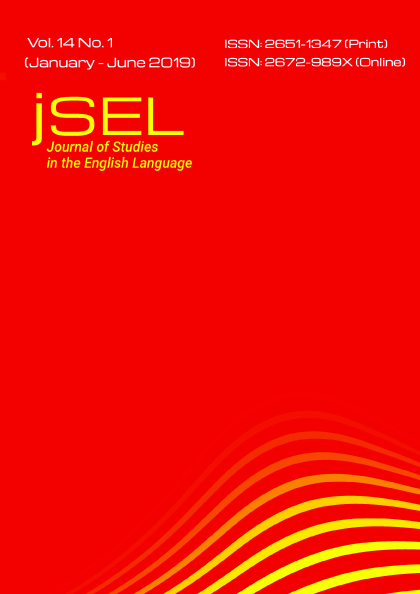Learner Expectations in an Intensive English Program (IEP)
Main Article Content
Abstract
In today’s fast-paced society, Intensive English Program (IEP) continue to thrive as more and more English language learners (ELLs) patronize them. This study aims to identify the expectations of Thai learners enrolled in these programs in Thailand. It employed a qualitative research inquiry among 185 freshmen students from different regions in the country. The result of the study presented four key areas which Thai learners value in an IEP program: teaching quality, characteristics of people in the institution, learning environment, and expectation of oneself. The study also revealed that the learners’ expectations are complicated probably as a result of the sociocultural value reflecting both the characters of traditional and progressive learners in Thailand.
Article Details
References
Altrichter, H., & Elliott, J. (2000). Images of educational change. Philadelphia, PA: Open University Press.
Asiyai, R. I. (2012). Assessing school facilities in public secondary schools in Delta State, Nigeria. African research review, 6(2), 192-205.
Bedi, K. (2006). Balancing learner expectations & educator perceptions in an online MBA course for exemplary learning. Retrieved from file:///c:/User/Administrator/Downloads/SSRN-id1606144.pdf
Bell, C. (2005). Managing learner's expectations: Developing learner-centered approaches. Development and Learning in Organizations: An International Journal, 19(1), 8-9.
Calderon, J., & Gonzales, E. (1993). Methods of research and thesis writing. Mandaluyong, Philippines: National Bookstore.
Choy, S., McNickle, C., & Clayton, B. (2002). Learner expectations and experiences: An examination of student views of support in online learning. (Research Report). Kensington Park, Australia: NCVER.
Dao, T. K., Lee, D., & Chang, H. L. (2007). Acculturation level, perceived English fluency, perceived social support level, and depression among Taiwanese international students. College Student Journal, 41(2), 287-295.
Fonagy, P., Twemlow, S. W., Vernberg, E., Sacco, F. C., & Little, T. D. (2005). Creating a peaceful school learning environment: The impact of an antibullying program on educational attainment in elementary schools. Medical Science Monitor, 11(7), CR317-CR325.
Foss, P., Carney, N., McDonald, K., & Rooks, M. (2008). Project-based learning activities for short-term for intensive english program. The Philippine ESL Journal 1, 57-76.
Goldenberg, C. (2008). Teaching English language learners: What the research does - and does not – say. Retrieved from https://digitalcommons.georgiasouthern.edu/esed5234-master/27
Gonzalez, S. (2016). Attribution theory: Dimensions of causality, stability and controllability according to learners. In Christina, G., Dietmar, T., Sarah, M., (Eds.), New Directions in Language Learning Psychology (pp. 209-232). Basel, Switzerland: Springer International.
Horwitz, E. K. (1999). Cultural and situational influences on foreign language learners' beliefs about language learning: A review of BALLI studies. System, 27(4), 557-576.
Insight Guides. (2016). Insight Guides Thailand. Bangkok, Thailand: Insight Guides.
International Education Division. (2010). The Intensive English Language Program (IELP) Guide. Melbourne, Australia: DEECD.
James, R. (2002). Student’s changing expectations of higher education and the consequences of mismatches with the reality. In OECD (Ed.), Responding to learner’s expectations (pp. 71-83). Paris, France: OECD.
Kerka, S. (1995). Adult Learner Retention Revisited. ERIC Digest No. 166. Washington, DC: ERIC.
Keyuravong, S. (2010). English language curriculum policy documents research into bilingual education in Thailand current policy and priorities for education at school. In Richard, J. (Ed.), Learning through English: Policies, Challenges and Prospects Insights form East Asia (pp. 69-95). Manchester, England: British Council.
Language Enhancement Center Payap University Chiang Mai. (2019). Intensive english program (IEP). Retrieved from https://lec.payap.ac.th/the- new-intensive-english-program/
McKeon, D. (1987). Different types of ESL programs. ERIC digest. Washington, DC: ERIC Cleaning house on Languuagesand Linguistics.
Ministry of Education Thailand. (2008). The basic education core curriculum B.E. 2551 (A.D. 2008). Bangkok, Thailand: Kurusapa Ladprao.
Moussu, L. M. (2006). Native and Nonnative English-Speaking English as a Second Language Teachers: Student Attitudes, Teacher Self-Perceptions, and Intensive English Administrator Beliefs and Practices (Doctoral dissertation). Purdue University in West Lafayette, Indiana.
Nguyen, T. H. (2005). Thailand: Cultural background for ESL/EFL teachers. Retrieved from https://www.hmongstudies.org/ThaiCulture.pdf
Otte, M., Christiansen, B., & Howson, A. G. (1986) Perspectives on mathematics education. Dordrecht, Holland: D. Reidel.
PedrÓ, F. (2012). Connected minds: Technology and today’s learners. Paris, France: OECD.
Peng, J. E. (2007). Willingness to communicate in an L2 and integrative motivation among college students in an intensive English language program in China. University of Sydney Papers in TESOL, 2(1), 33-59.
Phillips, H. P. (1965). Thai peasant personality: The patterning of interpersonal behavior in the village of Bang Chan. Los Angeles, CA: University of California Press.
Saldana, J. M. (2015). The coding manual for qualitative researchers. London, UK: Sage.
Shields, M. A., & Price, S. W. (2002). The English language fluency and occupational success of ethnic minority immigrant men living in English metropolitan areas. Journal of population Economics, 15(1), 137-160.
Uline, C., & Tschannen-Moran, M. (2008). The walls speak: The interplay of quality facilities, school climate, and student achievement. Journal of Educational Administration, 46(1), 55-73.
Vathanaprida, S., & MacDonald, M. R. (1994). Thai tales: Folktales of Thailand. Englewood, NJ: Libraries Unlimited.
Weenink, D. (2008). Cosmopolitanism as a form of capital: Parents preparing their children for a globalizing world. Sociology, 42(6), 1089-1106
Williams-Leon, T., & Nakshima, C. L. (2001). The sum of our parts: Mixed heritage Asian Americans. Philadepphia, PA: Temple University Press.
Wiriyachitra, A. (2002). English language teaching and learning in Thailand in this decade. Thai TESOL focus, 15(1), 4-9.
Yeh, C. J., & Inose, M. (2003). International students' reported English fluency, social support satisfaction, and social connectedness as predictors of acculturative stress. Counselling Psychology Quarterly, 16(1), 15-28.


